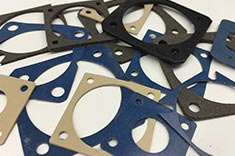EMI Shielding Products
- Custom Gasket Fabrication
- Connector Gaskets
- Bonded O Ring
- Custom Gaskets
- Conduct-O-Knit Knitted Wire Mesh
- Conduct-O-Seal Combo Gasket
- Conduct-O-Elastomer
- Conduct-O-Seal Oriented Wire in Silicone Gasket Material
- Conduct-O-Mesh Tape
- Conduct-O-Foam
- Conduct-O-Bond
- Optical Filters For Electronic Displays
- Shielded Vent Panels
- ESC Board Level Shielding
- 300 Series
Comparing and Contrasting RF Shields and RF Absorbers
 In the world of electronic devices and systems, radio frequency (RF) energy is both a necessity and a potential source of interference. Engineers and designers rely on two primary techniques to mitigate interference and maintain optimal performance: RF shielding and RF absorbing. Below we will discuss the differences between RF shields and RF absorbers.
In the world of electronic devices and systems, radio frequency (RF) energy is both a necessity and a potential source of interference. Engineers and designers rely on two primary techniques to mitigate interference and maintain optimal performance: RF shielding and RF absorbing. Below we will discuss the differences between RF shields and RF absorbers.
RF Shields
Benefits of RF Shielding
- Effective at blocking RF energy: RF shielding materials protect against interference from external RF sources.
- Widely applicable: RF shielding can be used in various industries, including electronics, telecommunications, aerospace, and medical equipment.
- Customizable: Shielding can be tailored to specific applications by varying the material's thickness, type, and shape.
Issues with RF Shielding
- Potential for reflection: RF shielding materials can reflect energy back into the protected area, creating the potential for resonances or standing waves that can interfere with device performance.
- Weight and size concerns: Metallic shielding materials can add significant weight and bulk to electronic devices, which can be undesirable in certain applications.
RF Absorbers
RF absorbing is a technique that uses materials designed to absorb RF energy, converting it into heat and dissipating it, thereby reducing the amount of reflected energy. This is particularly useful in situations where reflection or redirection of RF energy is undesirable.
Benefits of RF Absorbing
- Reduced reflections: RF absorbing materials minimize the risk of resonances or standing waves caused by reflected energy.
- Flexible and lightweight: Absorbing materials are often available in foam, rubber, or fabric forms, which can be easily integrated into various applications without adding significant weight or bulk.
- Enhanced performance in confined spaces: RF absorbers are ideal for compact environments where reflections are more likely to occur.
Issues with RF Absorbing
- Limited protection: RF absorbing materials are generally less effective at blocking RF energy compared to RF shielding materials and may not be suitable for applications requiring maximum protection.
- Heat dissipation: As RF absorbing materials convert energy into heat, they may require additional cooling or ventilation to prevent overheating.
Best Time to Use Each
Use RF shields when:
- Maximum protection against RF interference is required.
- The risk of reflection can be managed or is not a critical concern.
- The weight and size of the shielding material are not significant factors.
Use RF absorbers when:
- Minimizing reflections and resonances is a priority.
- Flexible, lightweight solutions are desired.
- Enhanced performance in confined spaces is needed.
For more information about protecting devices from RFI, you should not hesitate to call our team. We are problem solvers, and we are ready to help you.



